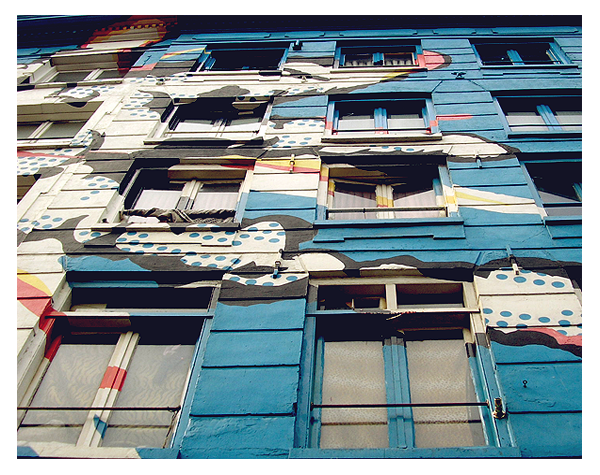
The better graffiti-work on a squatted house in the Spuistraat.
Despite efforts by the national government to legally forbid squatting, Amsterdam's squatters' community still seems to be holding strong. In some areas, squatters have even opened bars in their occupied houses, offering consumptions for fair prices. Without being a squatter myself (I feel a lot more secure paying rent), I have met quite some people who live in a house they 'occupied'. These people were always open-minded and decent, and I support their motives for squatting wholeheartedly (it's really difficult to find an appartment or a room within the city, while on the other hand, many houses have been empty for years). However, some violent incidents with squatters have given the community a bad name. One of the incidents took place in Vrankrijck, the house you can see on the photo. A squatter attacked someone in there, and later refused access to the rescue units who came to save the victim's life. The victim did not survive. As you can see, this is truely a house with a story.


Oh my gosh, that's awful! Were they able to catch the squatter?
BeantwoordenVerwijderenManila has major problems about squatters too, but none in buildings this whole. Mostly, they set up makeshift houses on empty land.
It's been a while since the incident took place, and at some point I stopped following the further developments, but I think they caught the squatter.
BeantwoordenVerwijderenIn Holland, by 'squatting' we mean the illegal taking of empty houses (and of course, we wouldn't be Holland if this was actually partly legal at the same time; if a house has been empty for one year, and its owner can't prove it will be bought within a determined period of time, squatters are allowed to occupy it).
Acá los okupas por lo general tienen una connotación negativa ya que muchos grupos han tenido vinculaciones con grupos terroristas como ETA. Demás que allá tienen un contexto más positivo (en Chile, como sabes, lo hacen todo "a medias").
BeantwoordenVerwijderen